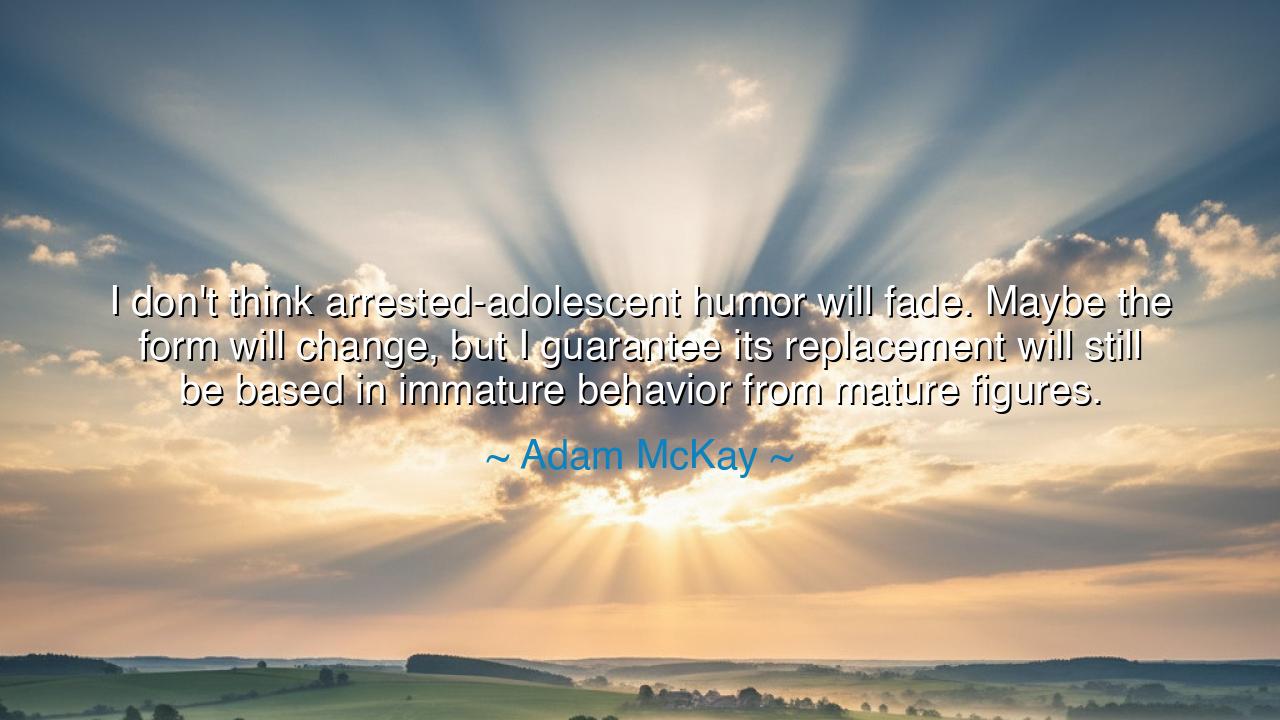
I don't think arrested-adolescent humor will fade. Maybe the form
I don't think arrested-adolescent humor will fade. Maybe the form will change, but I guarantee its replacement will still be based in immature behavior from mature figures.






Hear now the words of Adam McKay, the jester-philosopher of our age, who declared: “I don’t think arrested-adolescent humor will fade. Maybe the form will change, but I guarantee its replacement will still be based in immature behavior from mature figures.” Though spoken in the realm of laughter, these words carry the weight of timeless wisdom. For they reveal a truth about the human spirit that has echoed since the dawn of civilization—that even as men and women grow in power, knowledge, and stature, the child within them never truly dies. It is this child, reckless and raw, who keeps the world alive with play, folly, and laughter.
What McKay calls arrested-adolescent humor is not mere silliness—it is the eternal pulse of humanity’s imperfection. It is the recognition that no matter how solemn our titles or how polished our manners, the core of our nature remains curious, flawed, and delightfully absurd. When a mature figure behaves foolishly—whether in jest or mistake—we are reminded that wisdom is not the absence of error but the acceptance of it. The laughter that follows such moments is not scornful; it is purifying. It frees us from the illusion of perfection and allows us to meet one another as equals in folly.
The ancients knew this truth long before McKay spoke it. In the temples of Athens, amid the grandeur of marble and philosophy, the people gathered not only for tragedies but for comedies—plays that mocked their leaders, their gods, and even themselves. Aristophanes, master of laughter, dared to depict the noble Socrates as a mad philosopher floating in the clouds, lost in his own thoughts. The audience roared, not because they despised wisdom, but because they saw in Socrates the same vanity and absurdity that lived in their own hearts. And so, the laughter of Athens became a form of understanding—a recognition that even the wise are human, and even the mighty must bow to the chaos of life.
In every age, the immature behavior of the mature has been both a mirror and a medicine. When kings jested, when philosophers stumbled, when the powerful revealed their foolishness, the people saw hope. For if those at the heights could fall, could laugh, could err—then perhaps the lowly could rise. Consider the tale of Diogenes, the Cynic philosopher, who mocked the great Alexander the Great himself. When Alexander offered to grant him any wish, Diogenes merely said, “Stand out of my sunlight.” The conqueror smiled, knowing he had met one who could not be conquered by pride. This was the humor of the immature spirit within the mature soul—a humor that cuts through power’s illusion and reminds the world of its shared humanity.
And so McKay, heir to this ancient tradition, speaks of the eternal return of foolishness. He tells us that the forms of laughter may change—the stage replaced by the screen, the fool by the comedian—but the heart of comedy remains the same. It will always spring from the clash between dignity and absurdity, between how we wish to appear and what we truly are. The sight of a noble man slipping on life’s metaphoric banana peel will always stir laughter, not from cruelty, but from recognition. In every age, humor survives because it reveals the unvarnished truth that the soul cannot be perfected—it can only be embraced.
This is why arrested-adolescent humor will never fade: it speaks to the universal longing to be free of pretense. It allows the weary adult to breathe again, to shed the armor of self-importance, and remember the reckless joy of youth. The mature figure who dares to act immature is not betraying wisdom, but honoring it—for to laugh at oneself is to acknowledge one’s limitations without shame. And in that laughter lies power, the kind that disarms fear and melts pride. The fool and the sage meet in that shared moment, and both become more human.
Let this, then, be the teaching to all who hear: do not fear your foolishness. The world will demand that you grow serious, that you clothe your heart in solemnity—but beware, for too much gravity crushes the spirit. Learn to laugh at your missteps, to find humor even in your failures, and to see in every ridiculous moment a lesson in humility. For as Adam McKay reminds us, the laughter of fools will always endure, not because we fail to mature, but because in laughter we remember what it means to live. The wise man who cannot laugh is a prisoner; the fool who laughs wisely is free.
So walk through life with grace and with mischief. Be bold enough to be absurd, and humble enough to laugh when the world reveals your flaws. For the gods themselves, it is said, delight in laughter—and when mortals join them in that joy, the boundaries between heaven and earth grow thin. Thus, let the laughter of the immature and mature alike echo through time, a reminder that beneath our crowns and robes, our learning and our labor, we are all still children—searching, stumbling, and smiling beneath the endless sky.






AAdministratorAdministrator
Welcome, honored guests. Please leave a comment, we will respond soon